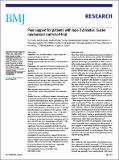| dc.contributor.author | O'Shea, Eamon | en |
| dc.date.accessioned | 2011-05-23T09:22:20Z | en |
| dc.date.available | 2011-05-23T09:22:20Z | en |
| dc.date.issued | 2011-02 | en |
| dc.identifier.citation | Smith, S. M.,Paul,G.,Kelly, A.,Whitford,W.L.,O¿Shea,E. & O'Dowd, T. (2011)Peer support for patients with type 2 diabetes: cluster randomised controlled trial BMJ. 342: d715. doi: 10.1136/bmj.d715. PMCID: PMC3039437 | en |
| dc.identifier.uri | http://hdl.handle.net/10379/1923 | en |
| dc.description.abstract | Objective: To test the effectiveness of peer support for patients with type 2 diabetes.
Design: Cluster randomised controlled.
Setting: 20 general practices in the east of the Republic of Ireland.
Participants: 395 patients (192 in intervention group, 203 in control group) and 29 peer supporters with type 2 diabetes.
Intervention: All practices introduced a standardised diabetes care system. The peer support intervention ran over a two year period and contained four elements: the recruitment and training of peer supporters, nine group meetings led by peer supporters in participant¿s own general practice, and a retention plan for the peer supporters.
Main outcome measures: HbA1c; cholesterol concentration; systolic blood pressure; and wellbeing score.
Results: There was no difference between intervention and control patients at baseline. All practices and 85% (337) of patients were followed up. At two year follow-up, there were no significant differences in HbA1c (mean difference '0.08%, 95% confidence interval '0.35% to 0.18%), systolic blood pressure ('3.9 mm Hg, '8.9 to 1.1 mm Hg)'total cholesterol concentration ('0.03 mmol/L, '0.28 to 0.22 mmol/L), or wellbeing scores ('0.7, '2.3 to 0.8). While there was a trend towards decreases in the proportion of patients with poorly controlled risk factors at follow-up, particularly for systolic blood pressure (52% (87/166) >130 mm Hg in intervention v 61% (103/169) >130 mm Hg in control), these changes were not significant. The process evaluation indicated that the intervention was generally delivered as intended, though 18% (35) of patients in the intervention group never attended any group meetings.
Conclusions: A group based peer support intervention is feasible in general practice settings, but the intervention was not effective when targeted at all patients with type 2 diabetes. While there was a trend towards improvements of clinical outcomes, the results do not support the widespread adoption of peer support.
Trial registration: Current Controlled Trials ISRCTN42541690 | en |
| dc.language.iso | en | en |
| dc.rights | Attribution-NonCommercial-NoDerivs 3.0 Ireland | |
| dc.rights.uri | https://creativecommons.org/licenses/by-nc-nd/3.0/ie/ | |
| dc.subject | Type 2 diabetes | en |
| dc.subject | Irish Centre for Social Gerontology | en |
| dc.title | Peer support for patients with type 2 diabetes: cluster randomised controlled trial | en |
| dc.type | Article | en |
| dc.local.publishedsource | http://www.bmj.com/content/342/bmj.d715 | en |
| dc.description.peer-reviewed | peer-reviewed | en |
| dc.contributor.funder | HRB | en |
| nui.item.downloads | 570 | |


